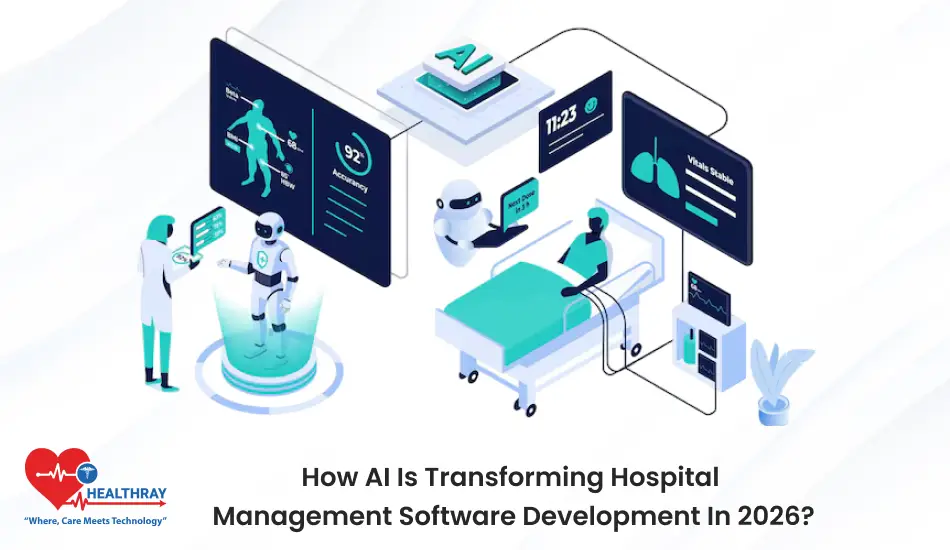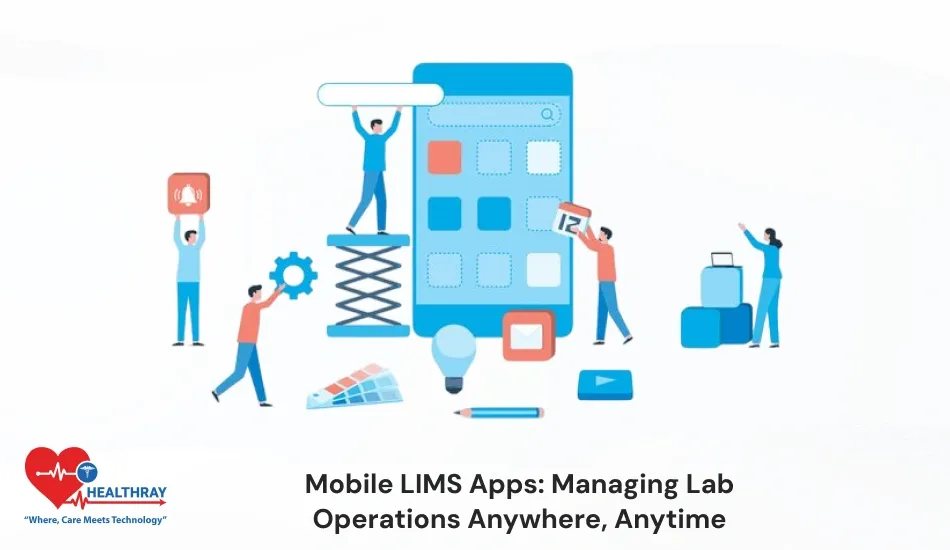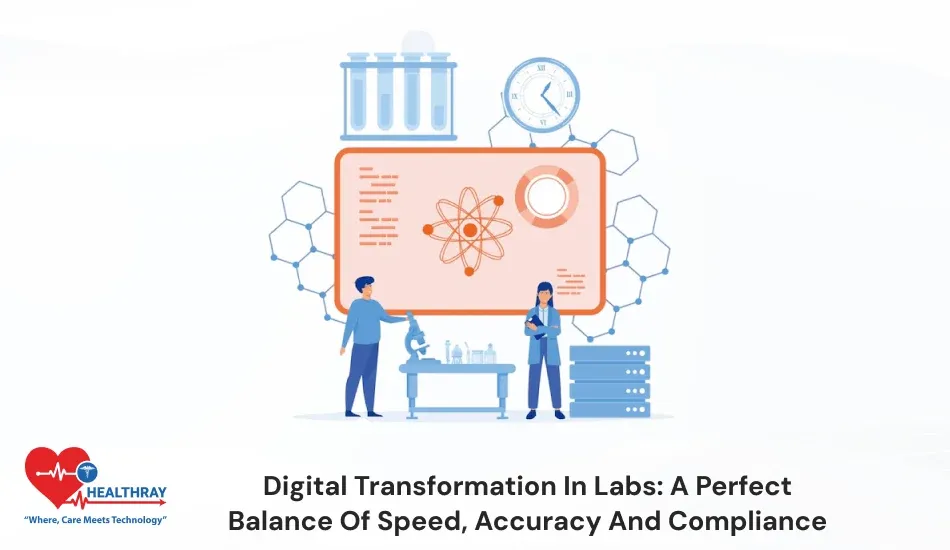AI transforms the conventional software development process for hospital management. Now, it is imperative that by 2026, hospitals reflect upon abandoning traditional technology and bringing about improvement via artificial intelligence at all levels, including maintaining patient data integrity and making life easier for patients and staff. In that order are smarter, quicker, and more patient-friendly hospitals.
So then, what does all that mean for the hospital manager and software developers? Literally more ears on the ground for the administrator to know which way of improving decisions and use of resources, while for a software developer, it could be a chance to design intelligent tools to solve the very same problems he faces in his work, such as patient flow, scheduling, and management bottlenecks.
The article provides an overview of how AI is being used in hospital management software, the real-world applications, the challenges, and the future. This will be material for the administrator who has to seek pragmatic solutions for the developer’s borders.
Role of AI In Hospital Operations – Smart Hospitals
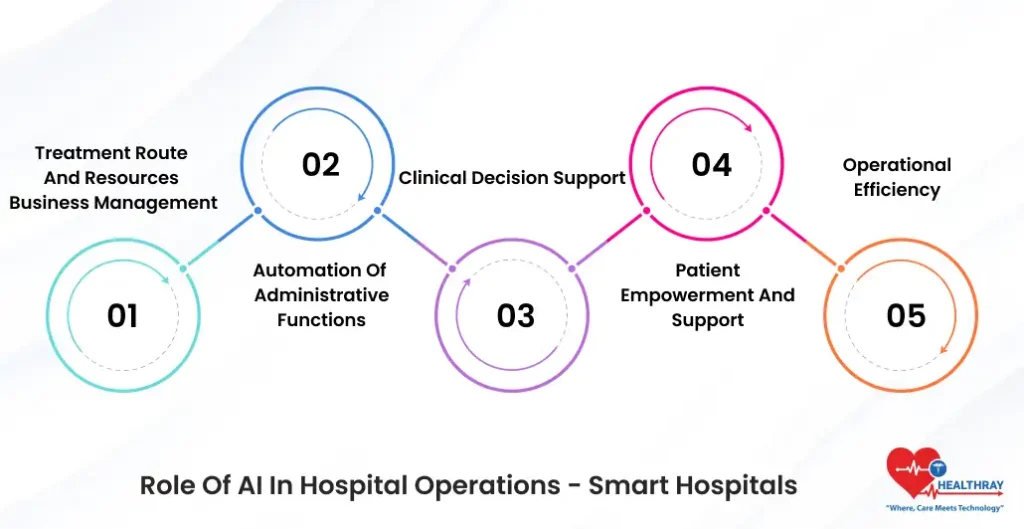
It has probably become the most disruptive innovation in the hospital, making it smart and intelligent vis-a-vis old problems, tested by unimpressive techniques. Many recent AI innovations that are being introduced take into proof that AI works very well where:
Treatment Route and Resources Business Management
It uses the information from the hospitals to make algorithms predicting the patient flows for the best utilization of all resources available. It’s doing those kinds of things linked for example to the moment in the emergency department with pretty regular staffing and the required resources.
Automation of Administrative Functions
Therefore, the automatic processing through AI as data entry, scheduling appointments and submission of insurance claims develops in the industry wherein essentially the team load will be minimized, reduced human errors and lead to faster processing time wherein ideally, every physical standby under processes would be benefited from higher energy systems.
Clinical Decision Support
In such a manner does an AI model support a clinician diagnostically, cleaning the data of problems as they present themselves, and abstracting the most what-have and are equipped with the quantity they always walk around with face to face. It is an AI model pattern recognition, which usually detects the disease in a patient’s record at an early stage or creates innovative personalized treatment that might through the patient’s history or genetic information get a hold of.
AI in Medical diagnosis introduces an automatic way of practice in care, mimicking natural life while preventing all the delay chances in diagnosis.
Patient Empowerment and Support
This may either be through AI-managed Call Centers or AI agents or other Auxiliary Services. Chatbots and Virtual Assistants are increasingly taking over the continued health monitoring of recently discharged patients. The chat clears out the waiting-room shape, at least in instances of further patient counseling, and gives alternatives in case needed assistance is required.
Operational Efficiency
AI presents a value add-on feature to the operation processes in hospitals besides process analysis and optimization. From the supply chain to energy usage, AI algorithms minimize waste and costs while maintaining seamless operations.
Case Studies: Real Life Instances of AI in Hospital Management
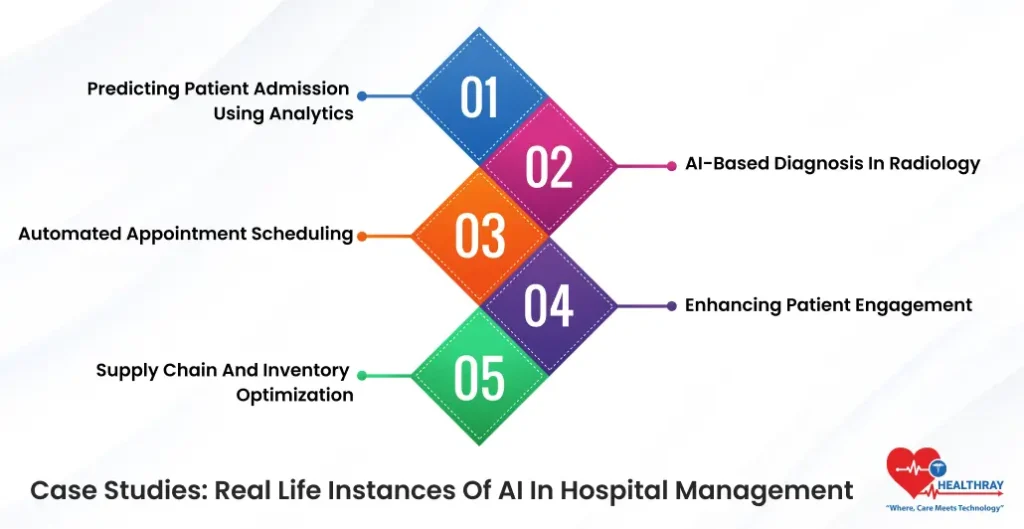
To understand the potential transformational changes from AI, it must be seen to be believed. Here are some real-life examples of AI transforming the way hospitals manage their systems:
Predicting Patient Admission Using Analytics
NYC deploys an AI algorithm, one of the largest hospitals in the metropolis, to make predictions of hospital admissions. This would allow accurate forecasting of inflows of patients several weeks ahead, based on trends in seasonal demand, the history of admissions to the hospital, and relevant happenings around the local area. It will enable the hospital to arrange proper staffing and resources while lessening the time a patient has to wait.
AI-Based Diagnosis in Radiology
A health care center in London adopted AI-powered imaging software for radiologists to be informed about abnormalities in X-rays and MRIs. The tool decreased errors in diagnosis and speeded up the review process, leading to much faster diagnoses and accelerated interventions.
Automated Appointment Scheduling
AI-based scheduling tools designed California multi-specialty hospitals so appointments were optimized by assessing the availability of physicians, the preferences of patients, and all previously scheduled appointments. This translated to a 20% drop in no-show rates, and thus a significant increase in appointment efficiency to speak of.
Enhancing Patient Engagement
A hospital network in India installed an AI chatbot to tackle patient queries, which covered all the query types concerning the services available or through which appointments might be scheduled for follow-up. Not only has the 24×7 availability of chatbots increased satisfaction rates among patients but it has also reduced stress on call center staff.
Supply Chain and Inventory Optimization
One of Japan’s biggest Hospital Management System Software established hospitals that incorporated Artificial Intelligence to monitor critical supply quantities, from medications to surgical equipment, and warn shortages. The system indicated possible shortages and provided optimal restocking schedules to minimize waste and ensure that essential items were always on hand.
Challenges for AI Integration in Hospital Management
In spite of its advantages, the implementation of AI in the hospital isn’t without challenges. There are challenges for hospitals and developers to overcome in order to ensure smooth adoption and sustainable success.
Data Privacy and Security
Hospitals, indeed, have sensitive information regarding patients, and therefore privacy becomes the major concern. Since large amounts of datasets are used for AI training and decision-making, data security issues arise. It can take time for AI deployment because regulations like HIPAA in the U.S. or GDPR in Europe must be followed.
Key Consideration: Prioritize the development of secure systems through encryption, anonymization, and strong access control.
Resistance to Change-
As hospitals are dealing with sensitive patient data, privacy is one of the greatest concerns. AI systems need to be exposed to very large data sets in order to understand and make decisions, thus giving rise to a question concerning data security. Regulations such as HIPAA in the United States and the GDPR in Europe require very strong compliance but hence delay deployments of AI.
Key Consideration: Effective change-management strategies along with proper communication about the merits that AI brings can ironically be helpful in overcoming resistance.
High Implementation Costs
There are great costs related to the development and integration of AI systems. In addition to AI software, hospitals need to invest in infrastructure such as cloud storage and processing power. Budget restrictions tend to limit the speed with which institutions can start implementing such advances. Designing cost-efficient, scalable AI systems requires specialized technical expertise, and many engineers build these capabilities through an Advanced Ai Engineering Course that focuses on real-world AI deployment and optimization strategies.
Key Consideration: Scalable, affordable AI integration solutions should be developed to fit the scale and needs of each hospital.
Inconsistent Data
AI systems need uniform-quality data in large quantities to be optimized. Hospital data, however, is mostly generated from different sources, including EHRs, imaging systems, and patient-monitoring devices. These diverse formats and standards create difficulties in integrating
Key Consideration: Developers should concentrate their attention on creating AI tools that could manage various data formats and support interoperability.
Ethical Concern
Reliability on AI raises ethical issues: for example, the algorithm could be biased, or the automated decision-making could suffer from too-great reliance. Patients and staff alike may worry that the human presence in healthcare may be sacrificed.
Key ethical consideration: Transparency, bias mitigation, and balance between automation and human input are vital for ethical AI development.
Scalability Constraints
What works in one hospital may not scale to the entirety of grid hospitals. Any deviation in infrastructure, patient demographics, or staff skills can affect AI performance and implementation.
Key consideration: Creating flexible systems that can be tailored to a variety of environments is key to wide-scale implementation.
The Future Trends: AI in Hospital Management Software Development
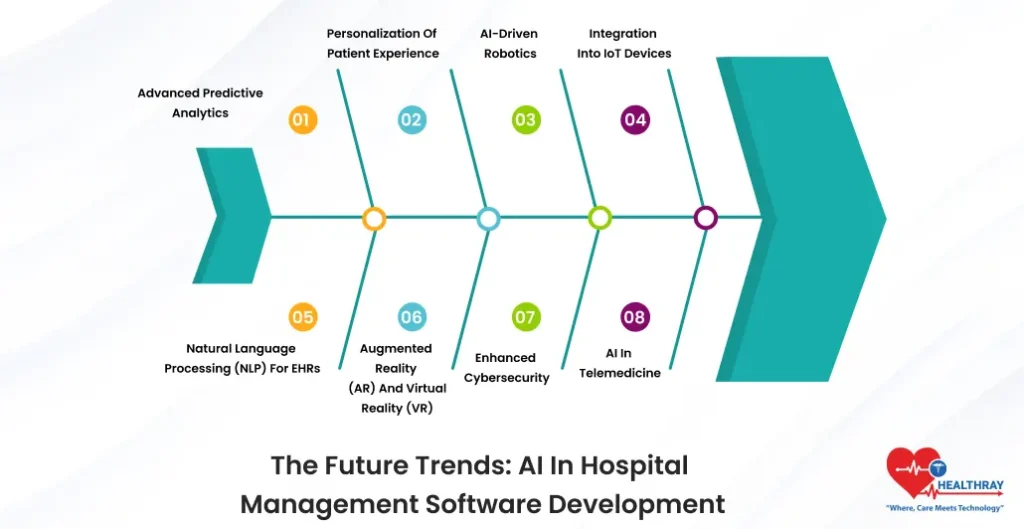
As AI continues to evolve, so too does its scope that could benefit hospital management. Following are some emerging trends that will be shaping the future of hospital software:
Advanced Predictive Analytics
AI will advance well beyond predicting greatly complicated inflow among patients. Future systems, using predictive analytics, will detect disease outbreaks early, survey population health trends, and make optimal allocation hospital resources more proactive. They make administrators smarter and data-driven at making decisions.
Personalization of Patient Experience
AI will carry from hyper-personalization of care plans targeting analyses of individual patient data such as genetics, lifestyle and previous treatments. It is thus going to move hospitals from the one-size-fits-all model to hyper-tailored healthcare experiences to achieve improved outcomes and even patient satisfaction.
AI-Driven Robotics
These would include everything from robotic surgical assistants to autonomous delivery robots. Advanced AI capabilities will gradually replace roles in hospitals, improve the level of precision and accuracy in procedures, reduce the workload on humans, and ensure smooth logistics- transporting medicines or other supplies.
Integration into IoT Devices
Already, IoT is shaking the healthcare industry. Bringing AI to the scene will go a long way. Real-time patient data will come from wearables and smart hospital beds and connected monitoring systems. Also, several companies take services from a healthcare software agency. AI will then process this data to provide actionable insights, such as early detection of health issues or alerts for immediate intervention.
Natural Language Processing (NLP) for EHRs
AI-powered NLP tools will thoroughly transform the ways in which a hospital can handle EHRs. Documentation will be automated as unstructured data of doctor’s notes will have relevant information extracted and aligned for ease of retrieval.
Augmented Reality (AR) and Virtual Reality (VR)
Such technologies, powered by AI, will contribute to the training of medical staff, carrying out remote surgeries, and educating patients. For instance, an AI-guided AR system may help doctors visualize complex surgical procedures in real-time.
Enhanced Cybersecurity
As hospitals become more interconnected, they increase their exposure to cyberattacks. The AI of the future is going to incorporate complex detection and prevention mechanisms against threats, which means that patient data as well as hospital systems would continue to be secured.
AI in Telemedicine
Telemedicine platforms will be enriched with AI on detecting conditions, recommending treatments, and triaging patients from a distance. Such things will ensure more accessible healthcare, especially in underprivileged areas.
Conclusion
Artificial Intelligence is transforming hospital management software development, affecting all facets of patient care, administrative processes, and overall operational efficiency. By 2026, hospitals will embrace AI-powered tools to deal with hands-on challenges such as resource allocation, engagement, and clinical decision support.
For administrators in hospitals, AI presents an opportunity to optimize workflows and improve patient outcomes. For software developers, it is a chance to create solutions for some of the pressing issues in healthcare without compromising safety, scalability, and interoperability.
But all in all, with issues such as data privacy, ethical concerns, and cost of implementation still hanging around delaying, future prospects for the integration of AI within the Hospital Management System are bright.
Addressing these barriers will free the potential of AI to provide even better, more effective health-care systems across the board. The time to begin integrating AI is now. The hospitals and developers embracing such advancements today will one day be better prepared for the health care landscape of tomorrow.
